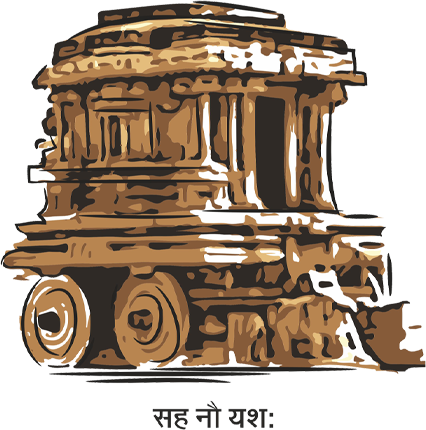
More Information
Climate
Indian climate is broadly classified as a Tropical Monsoon climate. There is however is much regional variation, throughout the year.
New Delhi situated in the heart of India sees high variation between summer and winter temperatures and precipitation. Summers starts in early April and peaks in mid may or early June with temperatures varying between 40°C to 45°C. Monsoon starts late June or early July and last till Mid-September. The average temperature during the monsoon shall be around 30-37°C with high humidity. July is the month with the most rainfall in New Delhi, with about 86 mm of precipitation.
Please visit https://mausam.imd.gov.in/delhiums/ for weather-related information.
Service Area for Participants
Participants' lounges with computers, internet access and printing facilities shall be available at the session's venue. Technical staff shall be on site to assist participants. Free wireless Internet connection shall be always provided in the entire venue.
Local Transportation and Transfers
Shuttle services will be provided to participants from the airport to all the recommended hotels on 20th and 21st July 2024. For those participants wishing to arrange their own private transportation from airport, the best options are:
- to take a metered taxi from Delhi Police Kiosks which is readily available at the ground floor entrance to the terminal 3;
- to use one of several available mobile app / internet taxi aggregators;
- take Delhi Metro Services from the IGI Airport metro station. For more information on the Delhi metro routes please refer https://www.delhimetrorail.com.
Shuttle buses will circulate between select hotels and the session venue and participants may avail this service. Participants who would prefer to rent their own vehicle may arrange it themselves with one of the many international or local transportation companies.
Time Zone
The Indian Standard Time (IST) is 5 and ½ hours ahead of Greenwich Mean Time (GMT +5:30).
Currency & Exchange
The currency in India is called the Indian Rupee (INR), with one Rupee being made up of 100 Paise, although the Paise isn't used anymore. The symbol for the Rupee is ₹. You'll often see it written as 'Rs' too. Banknotes come in Rs 10, Rs 20, Rs 50, Rs 100, and Rs 500, while coins are in Re 1, Rs 2, Rs 5, Rs 10, and Rs 20.
In India, it's easy to change money and make transactions. You can do this at authorized places like exchange bureaus in airports, shopping centers, and other spots in New Delhi. Most major credit cards like Visa, MasterCard, Rupay, Diners and American Express are accepted everywhere. You'll also find plenty of Automated Teller Machines (ATMs) around. People also use revolutionary digital methods like Net banking and UPI Payment.
Gratuities
Restaurants in India generally levy a service charge in the bill over the mandatory government GST taxes. The service charge is voluntary and goes towards staff wages.
At restaurants where a service charge isn't included, a tip of 5 to 10 % is considered sufficient. Although tipping is voluntary it will be well received.
Electricity Supply
For India, the voltage is 220 V and there are three associated plug types, types C, D and M.
Plug type C is the plug which has two round pins. Plug type D and plug type M both have three round pins in a triangular pattern but the pins of Plug type M are larger than Plug type D.
A travel plug adapter may be required if your appliance's plug does not match the shape of these sockets. Hotels will have a limited number of adapters for guest use, so it is recommended to carry your own if needed during your stay.
Smoking /Consumption of Liquor
Smoking and consumption of liquor is prohibited in public spaces under the Indian Law. There are designated spaces offered for smoking in restaurants, hotels, Airports and many workplaces. Alcohol is served in many restaurants and is available for purchase from licensed vendors.
Telephone, Mobile & Useful Phone Numbers
Roaming agreements are in place with most international phone companies. SIM cards can be purchased at local phone stores (ID required) at Airports, Malls or shopping centers. WhatsApp is widely used for texting, calling and messaging. Alternative apps like Signal, FaceTime are also available
Country Code: +91
National Emergency Number: 112
Police: 100
Fire: 101
Ambulance: 102
Disaster Management Service: 108
Women Helpline: 1091
Tourist Helpline: 1363
Medical Care
Modern medical care and medicines are available in several hospitals and clinics at New Delhi. Pharmacies are common throughout the city and prescriptions are required for only certain type of medicines. Payment at all medical facilities is due at the time of service via cash, card, or UPI.
The Host Country will provide a first-aid service for participants at the meeting venue. All other medical services will not be covered.
Participants are expected to assume the costs of any medical treatment that they might receive while in India. It is strongly recommended that medical insurance be purchased in your home country to cover at New Delhi as well as any other destinations on your journey. The Host Country will not be responsible for travel and medical insurance costs of the Session participants.
Meals and Refreshments
During the session, coffee, tea, water and some refreshments will be offered outside the main plenary hall. A food court shall also be available at the venue premises on payment basis.
Prayer Room
Prayer Room will be at participants' disposal during the entire Committee session. Additional information regarding the location of the prayer room is available on the host country website.https://46whcnewdelhi2024.nic.in

